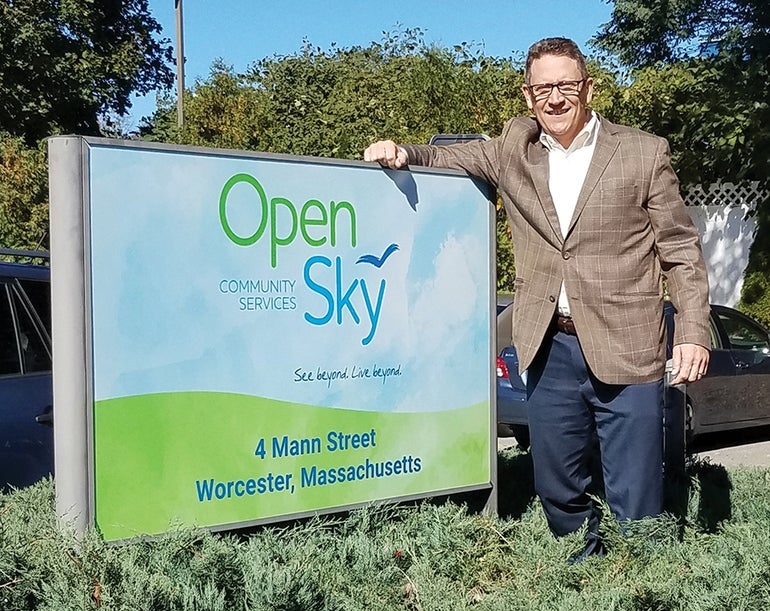In July, The Bridge of Central Massachusetts in Worcester joined forces with Alternatives Unlimited of Whitinsville, merging all aspects of their operations while keeping the corporations separate. This created a mental and behavioral health nonprofit with $82 million in revenue. Ken Bates, the president and CEO of The Bridge, has taken over leadership of the entity now rebranded Open Sky Community Services.
How is the merger coming along?
Two steps forward, one step back. The joining of two complementary organizations with different approaches to our work is both what is great about it and challenging. We are bringing all of our systems together: management systems, financial systems, technology systems. We are even creating new, by taking the best of both.
Why join the two organizations together?
We came together to fully participate, prepare and position for the changing landscape in health and human services, which forces organizations today to really think differently and act differently to provide services. The way health care is reforming and the way state organizations are approaching mental health in things like developmental services are retooling how they are purchasing services.
Health care in Massachusetts is undergoing a transformation, both on the public and private side. The system is moving to accountable care, value-based services, and away from fee-for-service payments.
Where does Open Sky fit in?
These changes in health care are forcing providers to think about people in a different manner. Mental health and substance use play a really big part in people’s health, and there is an acknowledgement of the social aspects of health. The large organizations understand if we are going to achieve this triple aim in improving quality, improving customer service and reducing costs, we have to pay attention to the person and the community where they live.
There is opportunity for organizations like Open Sky to bring forth all we can offer to help people in our community to achieve that triple aim.
One of the great things about us coming together is blending the power of a best-practices approach while strengthening communities, which plays a huge role in helping people live their best life: employment, housing, volunteering.
When did you decide a merger was best?
The Bridge and Alternatives have a long relationship of working together for the past 15 years, serving people side-by-side. The decision about us coming together was about providing better services in an evolving landscape. Areas like information technology, electronic health records, demonstrating value in the healthcare equation, hiring and training are easier and less costly now that we are building this one organization – Open Sky – together.
What are the operating margins like?
We have $82 million in revenue. The margins are very thin, about 1.5 percent.
Around 1 percent of our revenue is fundraising. We rely very heavily on state government for our funding.
Is relying on the state volatile?
When the state sneezes, we catch a cold. The state has not sneezed in awhile and is doing quite well. The state agencies we deal with have been very supportive of our industry and invested in the industry.
Looking long term, though, the diversification of our revenue is important. We need to think about other Medicare/Medicaid funding, other commercial insurance and accountable care organizations.
How do you work with ACOs?
One of our newest endeavors is our Central Community Health Partnership. We were selected by the state to be a community partner, along with AdCare, LUK, Inc. and Venture Community Services. This is the state investing in community partners to help coordinate better care with the primary care providers – the ACOs – for people with complex challenges, like behavioral health and those needing long-term services and support. Through that, we are providing services to about 2,400 people in Central Mass.
What challenges do you face?
The greatest challenges we have every day is recruitment and retention of our human services workforce. It really is at a crisis for us in Massachusetts, as well as many other parts of the country. There is a real shortage of direct-care professionals working in the community. Being able to pay them a livable wage is really hard, given our funding. We pay $13-$14.50 per hour to work with people who have great challenges in their day-to-day life. The things our staff deal with on a day-to-day basis is pretty intense. Folks with suicidal behavior. People with serious substance abuse. It is very stressful work.
This interview was conducted and edited for length and clarity by WBJ Editor Brad Kane.

